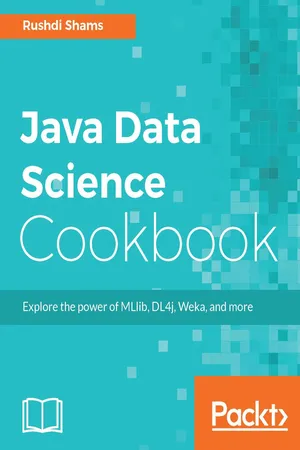
Java Data Science Cookbook
Rushdi Shams
- 372 pages
- English
- ePUB (adapté aux mobiles)
- Disponible sur iOS et Android
Java Data Science Cookbook
Rushdi Shams
À propos de ce livre
Recipes to help you overcome your data science hurdles using JavaAbout This Book• This book provides modern recipes in small steps to help an apprentice cook become a master chef in data science• Use these recipes to obtain, clean, analyze, and learn from your data• Learn how to get your data science applications to production and enterprise environments effortlesslyWho This Book Is ForThis book is for Java developers who are familiar with the fundamentals of data science and want to improve their skills to become a pro.What You Will Learn• Find out how to clean and make datasets ready so you can acquire actual insights by removing noise and outliers• Develop the skills to use modern machine learning techniques to retrieve information and transform data to knowledge. retrieve information from large amount of data in text format.• Familiarize yourself with cutting-edge techniques to store and search large volumes of data and retrieve information from large amounts of data in text format• Develop basic skills to apply big data and deep learning technologies on large volumes of data• Evolve your data visualization skills and gain valuable insights from your data• Get to know a step-by-step formula to develop an industry-standard, large-scale, real-life data product• Gain the skills to visualize data and interact with users through data insightsIn DetailIf you are looking to build data science models that are good for production, Java has come to the rescue. With the aid of strong libraries such as MLlib, Weka, DL4j, and more, you can efficiently perform all the data science tasks you need to.This unique book provides modern recipes to solve your common and not-so-common data science-related problems. We start with recipes to help you obtain, clean, index, and search data. Then you will learn a variety of techniques to analyze, learn from, and retrieve information from data. You will also understand how to handle big data, learn deeply from data, and visualize data.Finally, you will work through unique recipes that solve your problems while taking data science to production, writing distributed data science applications, and much more—things that will come in handy at work.Style and approachThis book contains short yet very effective recipes to solve most common problems. Some recipes cater to very specific, rare pain points. The recipes cover different data sets and work very closely to real production environments
Foire aux questions
Informations
Java Data Science Cookbook
Java Data Science Cookbook
Credits
| Author Rushdi Shams | Copy Editors Vikrant Phadke Manisha Sinha |
| Reviewer Prashant Verma | Project Coordinator Nidhi Joshi |
| Commissioning Editor Veena Pagare | Proofreader Safis Editing |
| Acquisition Editor Ajith Menon | Indexer Aishwarya Gangawane |
| Content Development Editor Cheryl Dsa | Graphics Tania Dutta |
| Technical Editor Dharmendra Yadav | Production Coordinator Arvindkumar Gupta |
About the Author
I would like to acknowledge the Almighty Allah for giving me the strength, support, and knowledge to finish the book.
I extend my thanks to my family members, friends, and colleagues for continuous support, encouragement, and constructive criticism.
I would also like to thank Ajith and Cheryl from Packt for their continuous and spontaneous collaboration with me.
About the Reviewer
I want to thank Packt Publishing for giving me the chance to review the book, as well as my employer and my family for their patience while I was busy working on this book.
www.PacktPub.com

Why subscribe?
- Fully searchable across every book published by Packt
- Copy and paste, print, and bookmark content
- On demand and accessible via a web browser